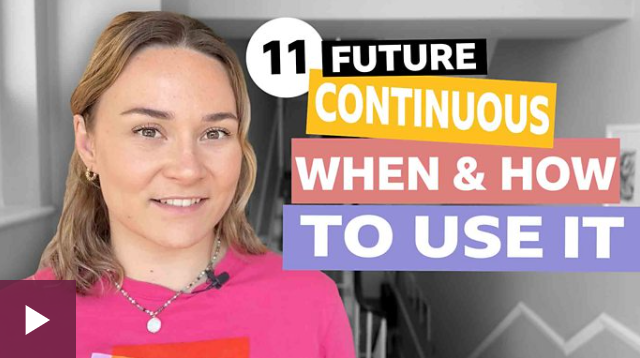USES OF FUTURE CONTINUOUS
To describe actions in progress at a particular time in the future.
- This time next week I’ll be moving all my stuff into the new house!
- In two weeks, we‘ll be celebrating our anniversary.
Useful vocabulary for actions in progress at a particular time in the future: this time next week/month/year
This includes planned events in the future.
- At 8pm the kids will be sleeping, so make sure you’re quiet.
- The guests will be arriving from around midday.
You can use it to make excuses for why you can’t attend something.
- Can you come to my birthday party?
- Sorry, I can’t. I’ll be driving to the airport at that time.
To make assumptions about what someone is doing in the present moment.
- Where’s Jenny?
- I don’t know, but I bet she’ll be sleeping. She said she was tired.
- Have you seen the dogs?
- No, but no doubt they’ll be playing in the garden.
Useful vocabulary for assumptions about what someone is doing in the present moment: I bet, no doubt
STRUCTURE
For positive sentences, use ‘will be’ after the pronoun, then add ‘-ing’ to the main verb. We often contract the form with an apostrophe.
- I will be walking > I‘ll be walking
- You will be walking > You‘ll be walking
- He will be walking > He‘ll be walking
- She will be walking > She‘ll be walking
- It will be walking > It‘ll be walking
- We will be walking > We‘ll be walking
- They will be walking > They‘ll be walking
For negative sentences, add ‘not’ after ‘will’. We usually contract the form with an apostrophe.
- I will not be walking > I won’t be walking
- You will not be walking > You won’t be walking
- He will not be walking > He won’t be walking
- She will not be walking > She won’t be walking
- It will not be walking > It won’t be walking
- We will not be walking > We won’t be walking
- They will not be walking > They won’t be walking
To ask yes/no questions, change the order of the sentence so ‘will’ is at the beginning.
- Will I be walking?
- Yes, you will be
- No, you won’t be
- Will you be walking?
- Yes, I will be
- No, I won’t be
- Will he be walking?
- Yes, he will be
- No, he won’t be
- Will she be walking?
- Yes, she will be
- No, she won’t be
- Will it be walking?
- Yes, it will be
- No, it won’t be
- Will we be walking?
- Yes, we will be
- No, we won’t be
- Will they be walking?
- Yes, they will be
- No, they won’t be
To ask for more information, add the ‘who, what, where, why, how, when’ question words at the beginning.
- Why will I be walking?
- Who will you be walking with?
- Where will he be walking?
- When will she be walking?
- How will they be walking?
